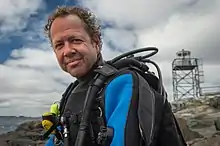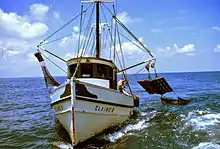Boris Worm
Boris Worm is a marine ecologist, and the Killam Research Professor at Dalhousie University in Halifax, Nova Scotia, Canada.[1] His research program focuses on changes in marine biodiversity, and the effects of fisheries, climate change, and other human impacts on global ocean ecosystems. He is a frequent commentator on marine environmental issues in the media, and has won numerous awards for his scientific work and public outreach.
Boris Worm | |
|---|---|
 | |
| Born | 1969 |
| Known for | Works on Global change, Overfishing |
| Awards | E.W.R. Steacie Memorial Fellowship (2011) Heinz Maier-Leibnitz Award (2004) |
| Scientific career | |
| Fields | Marine ecology, fisheries science |
| Institutions | Dalhousie University |
He received both a M.Sc. (1996) and Ph.D. (2000) from the University of Kiel, Germany and worked as a postdoctoral fellow with the late Ransom A. Myers at Dalhousie. He joined the faculty at the Biology Department, Dalhousie University in 2004. Dr. Worm and his students have published over 100 peer-reviewed scientific articles,[2] several of which have become citation classics. Dr. Worm was identified as a Highly Cited Researcher by Thompson-Reuters in 2014.
Dr. Worm has contributed to several well-known ocean documentaries, including Sharkwater (2007), End of the Line (2007), Revolution (2012), and Racing Extinction (2015). Since 2010, Dr. Worm has produced a regular column for CBC Radio, focusing on ocean science and policy. Since 2013 he is the Scientific director of Ocean School, a collaborative ocean education initiative between Dalhousie University and the National Film Board of Canada.
Selected publications
- Myers RA, Worm B (2003) Rapid worldwide depletion of predatory fish communities. Nature 423:280-283
- Worm, et al. (2006) Impacts of Biodiversity Loss on Ocean Ecosystem Services. Science, 314: 787-790
- Worm, et al. (2009) Rebuilding Global Fisheries. Science, 325 (5940): 578–585.
- Tittensor DP, Mora C, Jetz W, Lotze HK, Ricard D, Vanden Berghe, E, Worm B (2010) Global patterns and predictors of marine biodiversity across taxa. Nature 466: 1098-1101
- Mora C, Tittensor DP, Adl S, Simpson AGB, Worm B (2011) How many species are there on Earth and in the ocean? PLoS Biology 9: e1001127
- Pinsky ML, Worm B, Fogarty MJ, Sarmiento JL, Levin SA (2013) Marine taxa track local climate velocities. Science 341:1239-1242
- Worm B, Paine RT (2016) Humans as a hyperkeystone species. Trends in Ecology and Evolution 31:600-607
- Worm B, Lotze HK, Jubinville I, Wilcox C, Jambeck J. (2017) Plastic as a persistent marine pollutant. Annual Review of Environment and Resources 42:1-26
References
- The Worm Lab, Dalhousie University.
- "Boris Worm - Google Scholar Citations". scholar.google.ca. Retrieved 2017-11-27.
